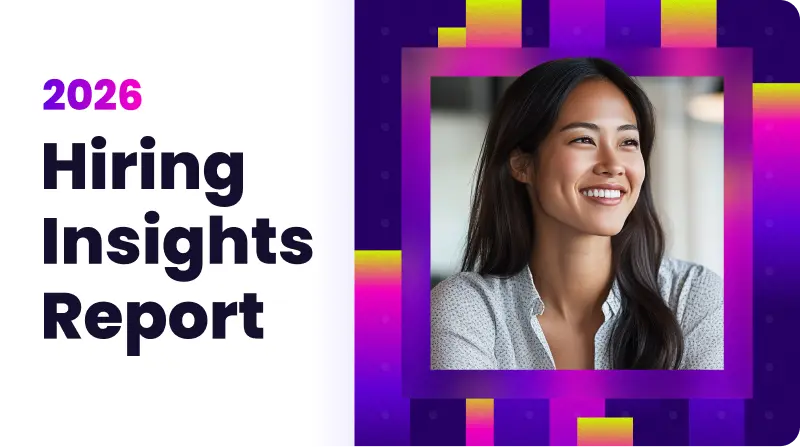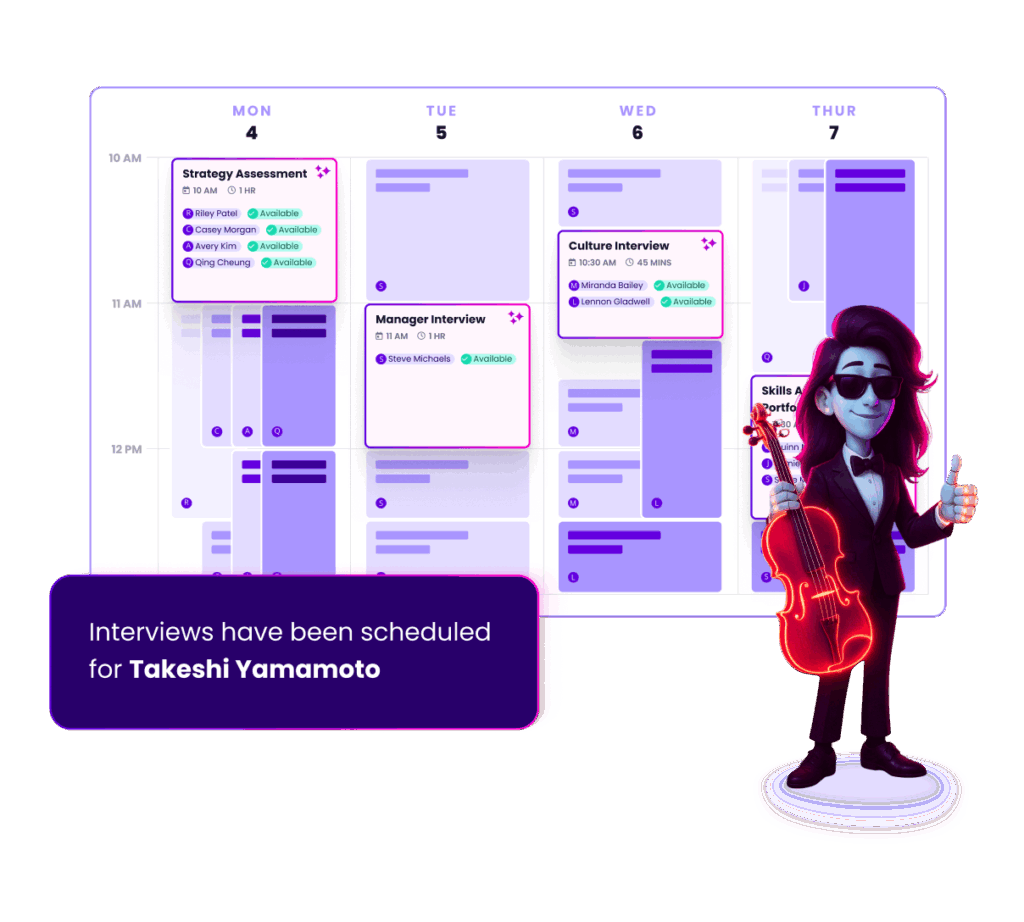Table of Contents
A well-executed interview is a critical factor for candidates when deciding whether to accept a job offer. That’s why it’s incredibly important to conduct proper interview training for employees.
When interviews go poorly, they lead to low-quality hiring decisions, avoidable legal troubles, a weak candidate experience, and interviewer burnout.
1 in 5 interviewers say they feel rushed to make hiring decisions, despite being ill-equipped to do so.
As a TA leader, putting in the time and work to attract talent in a competitive, candidate-driven market is tough. This becomes even more difficult if you’re carrying most of the interview logistics load on your own.
But by spending time on interview training for employees, you can lighten the load for yourself as well as any other interviewers on your team. Great interviews start with amazing interviewer training. Run through this checklist to make sure your interview training program is setting your current and future employees up for success.

Unlock 2026’s top hiring strategies: Insights from 500+ TA leaders
Be the first to uncover deep hiring insights specific to your sector — straight from the highest-performing TA teams.

1. Always predetermine job competencies
Interviewers should never walk into an interview without knowing exactly what they’re looking for first. Make sure to make this crystal clear in your intake meeting.
Armed with a vision for what success looks like in the role they’re trying to fill, interviewers can then turn attention to evaluating their interviewees fairly and effectively. But without a picture of the ideal candidate, interviewers risk making decisions that are bad or biased—or worse, both.
As a hiring leader, you can set your entire interview team up for success by providing hiring criteria. Tie these criteria to job-specific skills and competencies to help interviewers avoid decisions based on the personal, demographic, or lifestyle chatter that often comes up during ad hoc interviews.
To get started, ask yourself these questions:
- Are there any professional certifications or knowledge requirements that are critical to the job?
- Are there any technical skills required for the new hire to have that can’t be trained on the job?
- Which soft skills will make a candidate successful in this role? (Think communication skills, time management, ability to work independently, problem-solving, ability to manage a team, etc.)
Then, create templates for your interview team, and store them in an easily accessible place, like a shared drive.
Everyone benefits from interview preparation: the company, the candidates, and the interviewers.
2. Start interviewing with the end in mind
Who are you looking for? Which technical skills do they need? What soft skills should they have? If you can’t answer these questions, you’re not ready to interview.
Start by assessing the skills necessary to succeed in the open role. This will help you gather information about your candidates’ job knowledge and technical skills.
Then, add behavior questions — which focus on soft skills such as creativity and collaboration — to gauge a candidate’s reaction to practical situations.
When you know what you’re looking for, you stand a much better chance of finding it.
When it comes to interviewing, one size does not fit all.
Many interviewers use the same conventional questions for each and every position, leading to rehearsed answers that say nothing about a candidate’s actual skills or passions.
To find the right person for the job faster, and reduce hiring bias along the way, tailor your interview questions to each individual job role.
By asking job-specific questions to every candidate, you’ll give them the opportunity to show off their skills and watch how they handle real-life, job-related scenarios.
4. Don’t skip out on standardizing
After you gather a set of questions that relate directly to the job role, it’s time to think about the way you present those questions.
It’s exceedingly common for hiring leaders to lack a consistent, standardized interview process. But unstructured interviews — which encourage free-flowing conversations and lead to subjective decisions — are one of the worst predictors of on-the-job performance.
On the flip side, structured interviews — where each candidate is asked the same set of questions, in the same way, and in the same order — help hiring leaders measure one candidate’s skills against another, allowing for much better decision-making.
When we asked Jenny Jongejan, a seasoned recruiting consultant about the importance of standardization to address tech’s hiring challenges, she told us, “Research does show that structured interviews are 81% more accurate in predicting job performance than unstructured ones, so having a set of standard questions that every interviewer asks every candidate really ensures that interviewers don’t insert their own bias and leads to better hires.”
Standardization starts with effective intake and ends with a clear, focused post-interview debrief. Don’t skip out on either meeting!
5. Mitigate implicit biases and illegal practices
Even with the utmost preparation, interviews can still go off the rails. For instance, an interviewer may inadvertently ask illegal questions or makes inappropriate comments.
Assuming that the interviewers already know which interview questions are “right” and “wrong” is the first mistake many hiring leaders make when it comes to legal compliance. To prevent discriminatory interview practices—whether intentional or not—TA leaders should educate their team about current hiring laws.
After carefully preselecting the job-specific criteria for each role, try creating an up-to-date list of questions and topics to avoid during interviews, including anything related to a candidate’s age, race, ethnicity, ability, gender, sexual orientation, religion, relationship status, or personal finances.
For example, instead of asking about the candidate’s country of origin, cue interviewers to ask if the interviewee is eligible to work in the country where the job duties must be performed. In lieu of asking if their religion would keep them from working on weekends or certain holidays, explain any scheduling requirements for the position, and ask if there are conflicts. Instead of asking candidates if they have any disabilities, ask if they’re capable of performing any physical demands of the job at hand.
With interviewer training on how to stick to appropriate topics, hiring leaders and interviewers can both feel confident about their interactions with candidates.
Cultivate a diverse interviewer team
Diverse hiring starts with diverse interviewers. When an interview panel shares similar backgrounds and lifestyles, it’s easy for unconscious bias to creep in, and for critical job-related skills to be overlooked. Not to mention, a largely homogeneous interview panel is a huge turn-off to talented candidates who may not see themselves represented.
The majority of hiring leaders acknowledge hiring for diversity as essential to growing a more competitive, innovative team. However, despite knowing the facts, many companies still struggle to implement thoughtful diversity and inclusion hiring that works.
6. Leverage the right technology
While legal compliance is critical, there’s more to an amazing interview than just following the rules. By employing technology to support the administrative parts of an interview, hiring leaders can empower interviewers to increase the quality and fairness of their interviews.
When interviewers get bogged down with back-and-forth scheduling and rescheduling, manually updating the hiring status of each candidate, and managing interviews across various time zones, they have less capacity to focus on more important things. But when technology takes care of the tedious tasks, interviewers are freed up for more valuable work, like building rapport with candidates.
HR technology can also be leveraged to put together diverse interview panels. This boosts candidate satisfaction even more. When candidates see themselves represented on an interview panel, and trust they’ll truly be included on their new prospective team, they’re far more likely to continue through to the end of the hiring process.
What’s more, by representing individuals from a variety of different groups and backgrounds, diverse interview panels lend themselves to higher quality hiring decisions because of the diversity of the interviewer feedback collected. Only then can your team stop making hiring decisions based solely on interviewer intuition, and start making more based on objective, quality interview data.
7. Focus on candidate engagement
In a candidate-driven market like this one, hiring leaders should assume that job seekers are interviewing with multiple companies. When that’s the reality, the engagement a candidate gets from your team could be just the advantage you need.
A focus on continuous candidate engagement will give you:
- Faster turnaround on hiring decisions
- More high-quality talent in your pipeline
- A higher number of engaged candidates
- A larger pool of more diverse candidates
- More candidates that turn into customers
To level up your candidate engagement, train interviewers to treat your candidates like your customers by giving them the power to self-schedule their interviews. Be sure to also give them plenty of quality feedback throughout the hiring process—even if they don’t get the job.
While candidates who don’t win the job they want may be disappointed, nothing is worse than waiting too long to find out. Not only does hanging in limbo directly affect the candidate’s experience, but it also damages the employer brand.
On the flip side, hiring teams who reject candidates quickly lessen the pain of rejection, leading to better quality hires and a still-in-tact brand reputation.
Motivate your interviewers with these stats on interview training
The fact is that some hiring managers and interviewers just seem unmotivated to participate in the interview training process, but it’s worth it. If you’re having trouble getting the hiring team on board, these stats should help convince them that it’s worth their time:
1. 99% of hiring managers who get interviewer training say they truly need it
Most hiring managers haven’t had interviewer skills training. However, almost 100% of those that go through either agree or strongly agree that they have more knowledge about the company’s hiring process and philosophy, and feel more confident about conducting effective interviews.
If that’s not a sign that you should implement interviewer training at the workplace right now, we don’t know what is.
2. Average time to hire Is 90 days
The average employer interviews six to 10 people for a job. This takes a process of about 2 to 3 months. If they still haven’t successfully hired someone, they would repeat this process.
Is your process taking so long that you’re missing out on top candidates? A solid foundation with standardized hiring processes and efficient, time-saving tech tools is key to securing the right candidates faster.
3. 20% of hiring managers ask illegal interview questions
One in 5 employers have unknowingly asked an illegal interview question before, and about one in three of them are unsure about whether or not the questions they are supposed to ask are legal.
The wrong type of questions give off the impression that the interviewer is unprepared, disinterested, or insensitive. Some questions may be intrusive or show a pattern of discriminatory practices and put the organization in a tenuous spot. Hiring managers must know what can and cannot be asked — and the TA team must insure this.
4. Unsuitable hires cost your company up to 30% of first-year earnings
This is broken down into retention, salary, and hiring a new candidate to replace the individual. It’s important to properly assess your candidates from the start, so that hiring managers can avoid the costs of a bad hire. This doesn’t take into account the expense to productivity, team morale, or time managing poor performance.
5. Workplace discrimination suits are won over 95% of the time
In 2020, the EEOC found 67,448 charges of workplace discrimination, winning just over $106 million for charging parties and other aggrieved individuals. This is a 95.8% success rate for their district court resolution outcome.
Untrained interviewers may not know what they can and cannot ask, and end up saying the wrong things during interviews that can aggravate candidates. This will put the company at the risk of liability, reputation damage, and losing out on quality talents.
6. The time it takes to make a good first impression = 7 seconds
Hiring managers only have one shot at a first impression with candidates. You have to make it count. Other studies have found that determining traits like trustworthiness takes just a tenth of a second.
7. Burnout can cost employees 34% of their annual salary
Finding the perfect fit for the company is one thing. It’s also essential to focus on a candidate’s well-being and communicate expectations the right way.
Get serious about interviewer training
Remember, more than just a way for companies to sift through potential employees, interviews help candidates get to know possible employers, too. When that interview comes across as hasty or chaotic, a previously inspired and eager candidate can become quickly disillusioned.
But when the interview is friendly and frictionless, candidates and hiring teams alike look forward to effective, efficient hiring experiences.
Train interviewers on how to create an amazing interview experience—then teach them to trust the process.
The time is now to implement interviewer training. GoodTime Hire helps you effortlessly train interviews, allowing you to track interviewers and their progress and train them at scale. Hire gives you the confidence that your selected interviewers evaluate candidates effectively.
Discover more about GoodTime’s interview scheduling software today.
Upgrade your hiring journey with AI
GoodTime’s AI agents orchestrate the entire hiring journey — screening, scheduling, messaging, and more — so talent teams hire faster with a better candidate experience.





